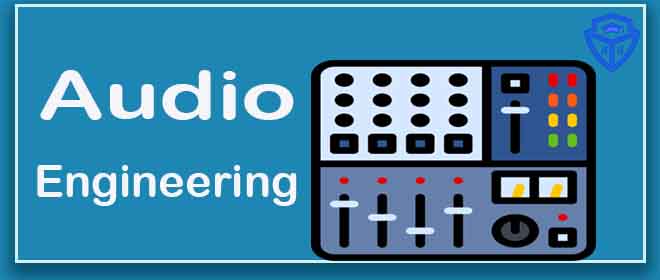
Audio Engineering
Updated On 28 Mar,2025

Sound Engineering, also known as Audio Engineering, is a specialized branch of engineering that deals with the recording, mixing, editing, and production of sound. It plays a crucial role in the music, film, gaming, and broadcasting industries, combining technical expertise with creativity to deliver high-quality audio experiences.
Why Choose Sound Engineering?
| Advantages | Details |
|---|---|
| High Demand | Growing industry in music, film, gaming, and OTT platforms. |
| Creative & Technical Field | Combines physics, electronics, and artistic skills. |
| Diverse Career Opportunities | Work in studios, live concerts, radio, film, and gaming. |
| Freelance & Entrepreneurship Options | Work independently or start a production studio. |
Eligibility Criteria for Sound Engineering
Educational Requirements
10+2 (Science/Arts/Commerce) with a strong interest in sound technology.
Some institutions prefer candidates with Physics and Mathematics background.
Diploma courses are available for students after Class 10.
Age Limit
Minimum Age: 17 years.
Maximum Age: No upper limit in most institutions.
Entrance Exams for Sound Engineering Admission
| Exam | Institutes Covered | Exam Level | Mode of Exam |
|---|---|---|---|
| FTII JET | Film and Television Institute of India | National | Offline |
| SRFTI Entrance Exam | Satyajit Ray Film & Television Institute | National | Offline |
| MIT NAT | MIT School of Music & Sound Engineering | University-Level | Online |
| AAFT Entrance Test | Asian Academy of Film & Television | University-Level | Online |
| Some Institutes Admit Based on Portfolio | Independent admission process | Institute-Level | Online/Offline |
Top Colleges for Sound Engineering in India
| Category | Top Colleges |
|---|---|
| Government Institutes | FTII Pune, SRFTI Kolkata, IIT Kharagpur (Acoustics & Audio Processing) |
| Private Universities | Whistling Woods International, MIT Pune, AAFT Noida |
| Music & Film Schools | KM Music Conservatory (Chennai), SAE Institute (Mumbai, Bangalore) |
Top Sound Engineering Institution Worldwide:
- Berklee College of Music: https://www.berklee.edu/
- Full Sail University: https://www.fullsail.edu/
- SAE Institute: https://www.sae.edu/
- University of Surrey: https://www.surrey.ac.uk/
- Middle Tennessee State University: https://www.mtsu.edu/
Specializations in Sound Engineering
| Specialization | Focus Area |
|---|---|
| Recording Engineering | Studio sound recording for music and podcasts. |
| Mixing & Mastering | Refining audio quality and balancing sound levels. |
| Live Sound Engineering | Handling sound in concerts and live events. |
| Game & Film Sound Design | Creating audio effects and background scores. |
| Broadcast & Radio Engineering | Managing audio for television and radio broadcasts. |
Career Opportunities in Sound Engineering
Top Hiring Sectors & Companies
| Sector | Top Companies/Studios |
|---|---|
| Film & TV Production | Yash Raj Films, Red Chillies Entertainment, Dharma Productions |
| Music Industry | T-Series, Sony Music, Universal Music, Saregama |
| Gaming & Animation | Ubisoft, Rockstar Games, EA Sports, Technicolor |
| Broadcasting & Radio | All India Radio, FM Radio Stations, Star Network |
| Live Sound & Events | Sunburn, NH7 Weekender, IPL, IIFA Awards |
Job Roles & Average Salaries
| Job Role | Average Salary (INR LPA) |
|---|---|
| Studio Sound Engineer | ₹5-12 LPA |
| Live Sound Engineer | ₹4-10 LPA |
| Film Sound Designer | ₹6-15 LPA |
| Audio Editor | ₹4-9 LPA |
| Acoustic Consultant | ₹7-18 LPA |
Admission Process for Sound Engineering
Step-by-Step Guide
✅ Choose the Right Institute – Decide between government, private, or film/music schools.
✅ Apply for Entrance Exams – Register and prepare based on the institute’s requirements.
✅ Prepare a Portfolio (if needed) – Some institutes prefer practical work samples.
✅ Appear for Interview/Audition – Show creativity and technical understanding.
✅ Complete Admission Formalities – Submit required documents and pay fees.
Scholarships & Financial Aid for Sound Engineering Students
| Scholarship | Eligibility | Coverage |
|---|---|---|
| FTII Scholarship | Top-performing students in FTII | Tuition Fee Waiver |
| KM Music Conservatory Scholarship | Meritorious students in sound engineering | Partial Fee Waiver |
| Saregama Music Scholarship | For aspiring sound engineers | ₹50,000 per year |
| NSP Scholarships | Government-backed aid for media students | ₹60,000 per year |
Future Scope of Sound Engineering
| Trend | Industry Impact |
|---|---|
| 3D & Spatial Audio | Enhancing virtual reality and gaming experiences. |
| AI in Music Production | Automated sound mixing and mastering. |
| Streaming Boom | Increased demand for high-quality music production. |
| Acoustic Architecture | Designing sound-friendly environments in studios and theaters. |
Music streaming and podcasting industry will grow at 15% CAGR.
3D audio technology will revolutionize gaming and VR experiences.
High demand for sound engineers in OTT platforms like Netflix and Amazon Prime.
FAQs about Sound Engineering Admission
Do I need a science background for sound engineering?
Not necessarily. A creative mindset and technical interest are more important.
Is a degree required to become a sound engineer?
A degree helps, but hands-on experience and portfolio matter more in this field.
Which is better: Sound engineering or music production?
Sound engineering focuses on technical aspects, while music production is more creative.
Can I work as a freelancer in sound engineering?
Yes, many sound engineers work independently on projects for films, YouTube, and advertisements.
Which country has the best opportunities for sound engineers?
USA, UK, Canada, and India have strong industries for sound and music production.
Final Thoughts
Sound Engineering is a booming career field with opportunities in music, film, gaming, broadcasting, and live events. Whether you dream of creating iconic soundtracks, designing game audio, or managing studio recordings, this field provides diverse, exciting, and well-paying career paths.
For admission guidance, career insights, and industry updates, stay connected with Admission Solver!